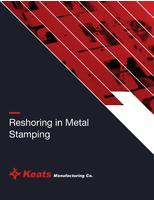A Better Truck Scale Cuts Downtime and Service Costs
Share:
To reduce excessive downtime and service costs, a Wisconsin foundry needed a truck scale that would stand up to harsh winters and heavy use. It needed a durable weighbridge and advanced load cell technology. By solving some of the common problems found in conventional truck scales, the new scale saves the site more than $10,000 annually.
ThyssenKrupp Waupaca (TKW) is the largest non-captive iron foundry in the world. A global producer of iron castings, the company makes components for light and heavy vehicles, construction, agriculture, HVAC and other industrial and commercial applications. Its largest facility is located in Waupaca, Wisconsin, USA, and operates 24 hours a day, 7 days a week. With 700 employees, the site melts more than 2,800 metric tons of metal per day.
Keeping the operation running requires trucking large amounts of material to and from the facility. There are constant deliveries of steel ingots, scrap steel, sand, limestone and other raw materials. Outbound trucks carry finished products and waste materials such as refuse sand.
TKW uses a single truck scale to weigh inbound and outbound trucks. The scale is essential for inventory and purchasing management of the raw materials and for ensuring compliance with highway weight limits. As the facility's only truck scale, it sees heavy use. During its busy periods, the scale handles 30 to 35 dump trucks in short order. TKW weighs more than 3,500 trucks annually.
Service problems
Although TKW's previous truck scale was only 8 years old, it had become a source of headaches. Brutal Wisconsin winters caused the I-beam weighbridge to corrode badly. Snow and ice built up within the scale structure, accelerating its deterioration. Additional problems resulted from the scale's analog load cells and from rabbits chewing on the load cell cables.
The scale was not standing up to the harsh environment. It experienced frequent breakdowns and required numerous expensive service calls. TKW was spending nearly $13,000 annually on unscheduled scale service, repairs, and recalibration. These costs were compounded by downtime spent waiting for parts to be shipped and for service personnel to arrive.
Finding the right scale
The need for a better truck scale was evident. Superintendent of Maintenance Bill Heschke and his team studied six proposals. Knowing the importance of the truck scale, the purchasing team asked the prospective suppliers for references. They contacted aggregates operations and other facilities with truck scales that experienced a similarly heavy duty cycle.
The TKW team also thoroughly evaluated the structural designs of the different scales.




